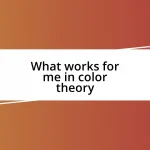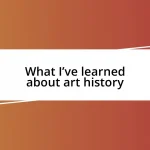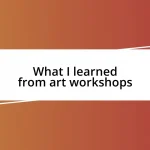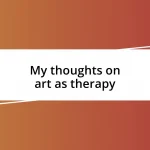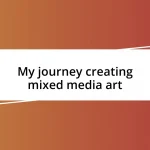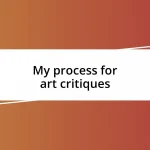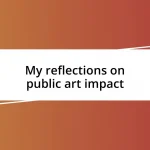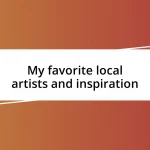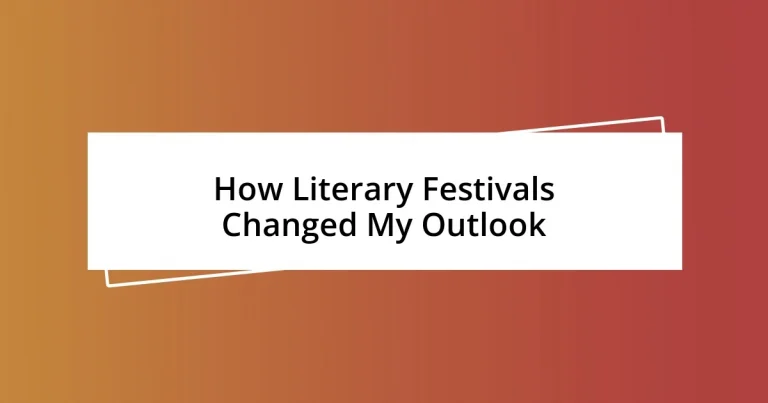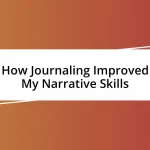Key takeaways:
- Literary festivals foster personal transformation by encouraging vulnerability and authenticity in storytelling, which deepens connections with both literature and others.
- Interactions with authors provide inspiration and insight into their creative processes, making literature feel more relatable and accessible.
- Engaging with diverse perspectives enhances empathy and critical thinking, allowing individuals to appreciate varying narratives and apply those insights to everyday life.
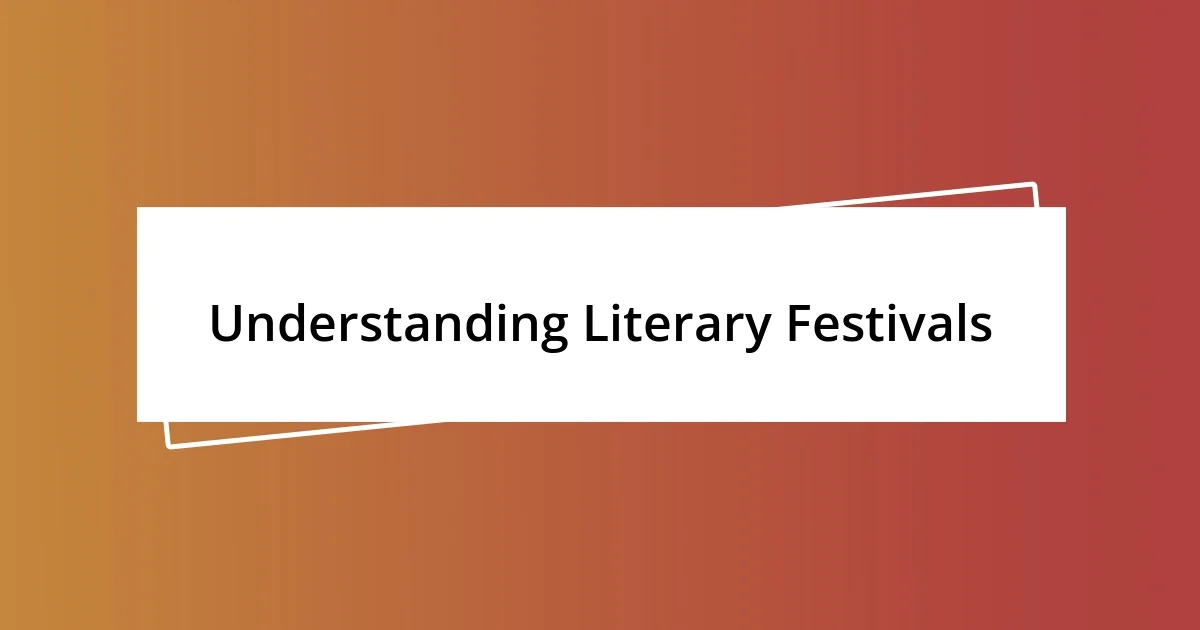
Understanding Literary Festivals
Literary festivals are vibrant gatherings that celebrate the written word, bringing together authors, readers, and literary enthusiasts. I remember attending my first festival and feeling a wave of excitement as I navigated stalls filled with books, each offering a glimpse into its world. It’s captivating how these events can connect you to an author’s mind, isn’t it?
What strikes me most about literary festivals is their role as a melting pot of ideas and perspectives. The conversations I’ve had with other attendees, often sparked by a panel discussion or a book signing, have deepened my understanding of diverse narratives. I often wonder: how can such encounters shift our perceptions and even ignite a passion for a genre we’d previously overlooked?
Each festival feels like a microcosm where stories come to life, and I truly cherish the spontaneity of it all. I recall one year when I found myself seated next to a poet who shared their creative journey, resonating deeply with my own aspirations. It’s moments like these that highlight the emotional resonance of literature; they remind us that we’re all part of a larger narrative tapestry, right?
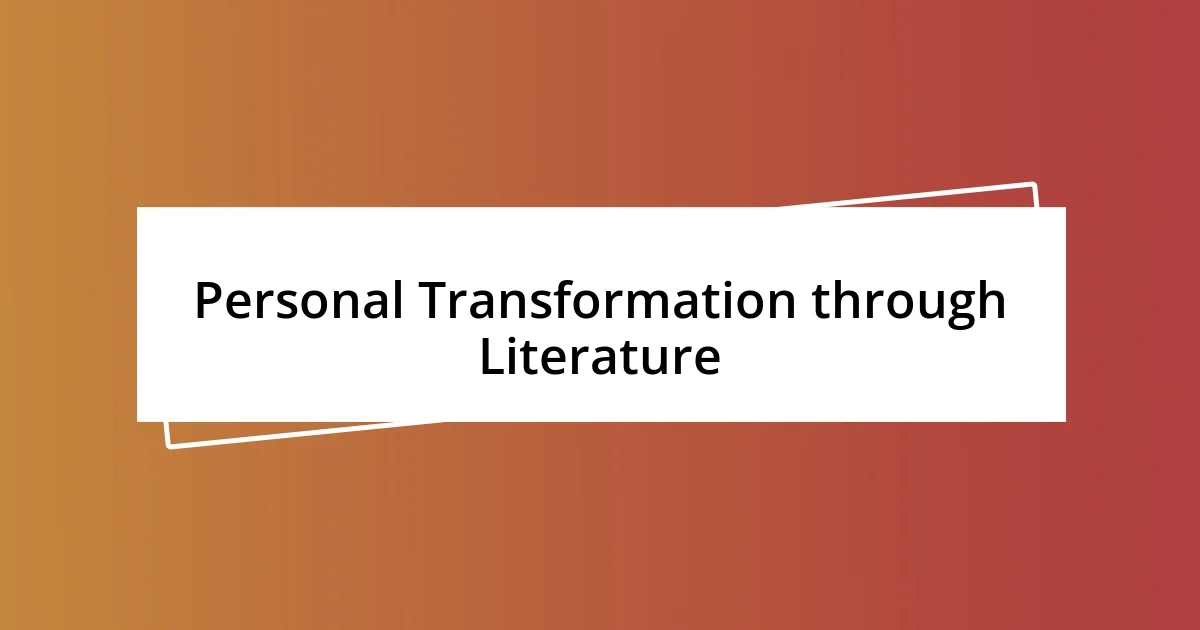
Personal Transformation through Literature
Attending literary festivals has transformed me in ways I never anticipated. I remember the first time an author held a Q&A session; their stories of failure and perseverance struck a chord in me. It was a wake-up call that literature isn’t just about the finished product, but also about the struggles and growth behind the scenes. This revelation encouraged me to embrace my own writing journey more openly.
Every conversation I’ve had at these events has been an opportunity for self-reflection. Once, during a late-night discussion with a fellow literature lover, we exchanged insights about vulnerability in storytelling. I walked away from that conversation feeling empowered to share my own stories, realizing that authenticity can create profound connections with others. This newfound appreciation for vulnerability has truly reshaped my outlook on both reading and writing.
Literature teaches resilience, and I have often found solace in the pages of books shared or discussed at festivals. At a panel focused on overcoming adversity, I listened to authors recount their toughest moments, which connected deeply with my own experiences. I left that festival feeling transformed; it was a reminder that through literature, we can find strength and inspiration in shared narratives.
| Aspect | Impact on Personal Transformation |
|---|---|
| Connection to Authors | Understanding the journey behind the writing process |
| Engaging Discussions | Encouragement to embrace vulnerability and authenticity |
| Resilience through Stories | Finding strength and inspiration in shared experiences |
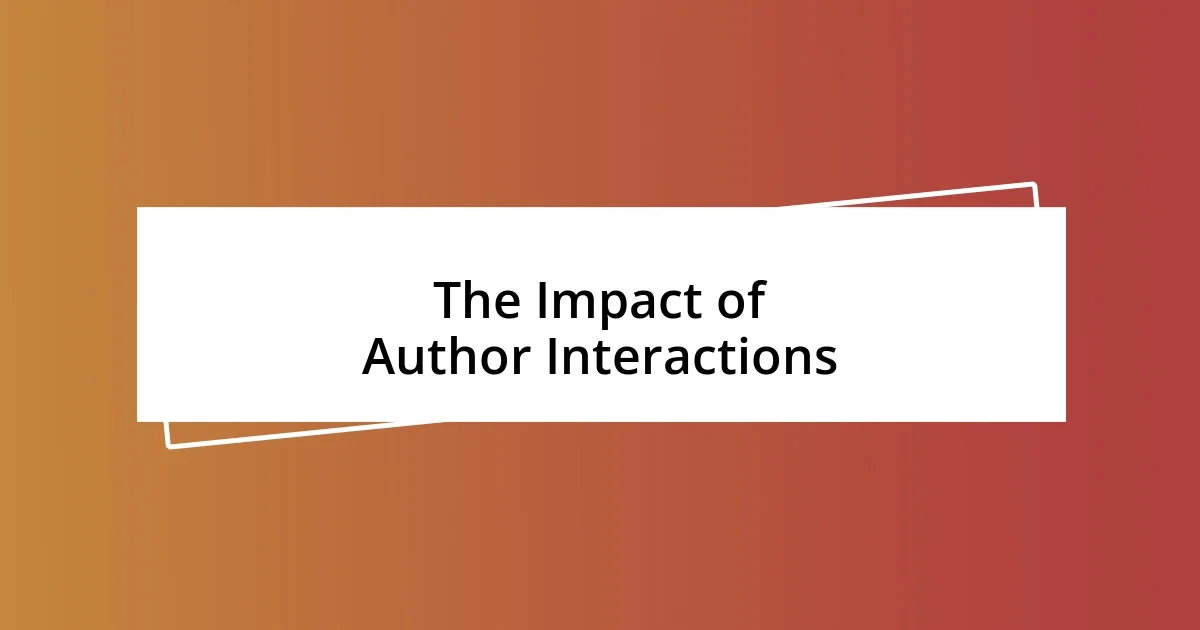
The Impact of Author Interactions
I’ve often found that face-to-face interactions with authors can be profoundly transformative. One year, I had the chance to chat with a well-known author during a signing. As they shared their creative process and some of the hurdles they faced while writing their latest novel, I felt a wave of relief wash over me. It reminded me that even the most celebrated writers grapple with self-doubt and setbacks. I realized this honesty could deeply influence how we connect with literature, making those stories feel more relatable and attainable.
- Authentic Connections: Engaging directly with authors fosters a sense of connection that transcends their written words.
- Inspiration from Struggles: Learning about an author’s challenges can motivate us to embrace our own creative paths.
- Encouragement to Explore: Conversations about their inspirations often lead to new genres or themes that I would have never considered before.
When I reflect on my interactions with authors at festivals, it’s the emotions they convey that linger with me. At a small roundtable with emerging writers, I listened to one author share a deeply personal narrative about their cultural background. Their vulnerability not only struck a chord within me but also encouraged everyone to peel back their layers and share their own stories. It’s moments like that that illuminate the power of narrative—how stories can forge bonds and create understanding among strangers.
- Emotional Resonance: Direct author stories reveal the emotional core of their work, making it resonate with my own experiences.
- Vulnerability as Strength: Observing authors’ willingness to be open inspires us to do the same with our narratives.
- Community Building: These interactions cultivate a sense of belonging amongst fellow attendees and authors alike.
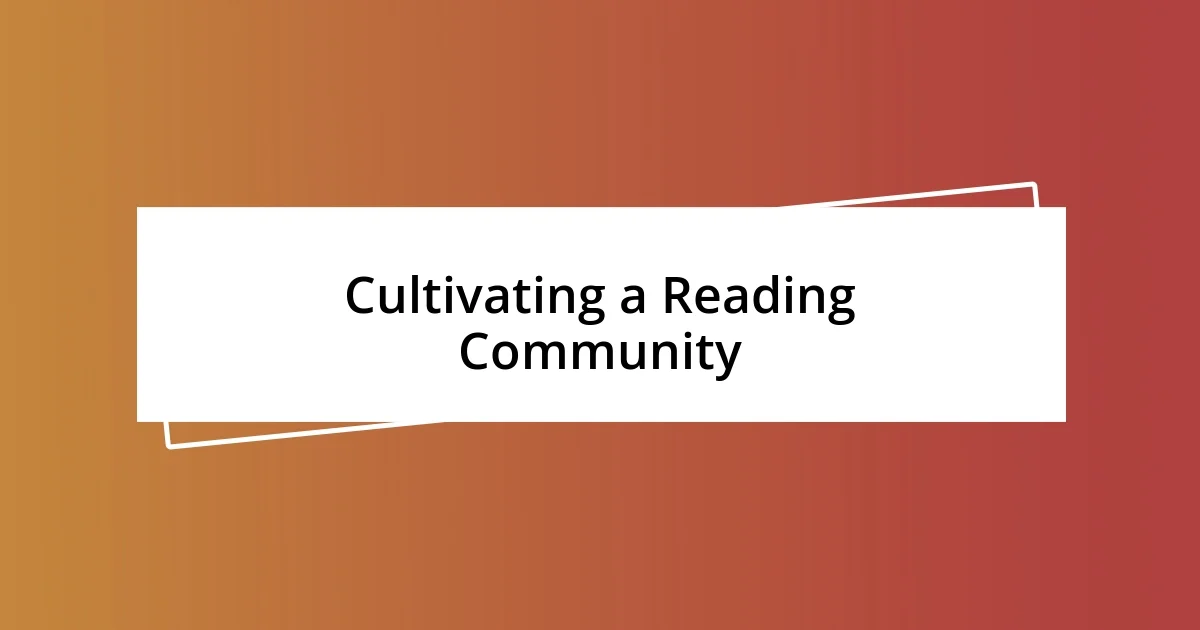
Cultivating a Reading Community
Cultivating a reading community at literary festivals has been one of the most enriching aspects of my experience. I remember attending a small gathering where readers and writers mingled over coffee, sharing insights about their favorite books. It was during these casual conversations that I felt an authentic connection forming with fellow book lovers, united by our shared passion. Have you ever felt the magic of finding someone who can talk about the same book with the same enthusiasm as you? It’s like discovering a hidden treasure.
Beyond just exchanging recommendations, these festivals foster a sense of belonging. I recall one evening at a local festival where I joined a book club discussion. The atmosphere was electric; readers from diverse backgrounds shared their interpretations of a single narrative. Listening to their perspectives opened my eyes to new dimensions of the story, prompting me to reflect on my own experiences. What if we all took a moment to learn from one another’s insights? It can truly deepen our understanding of literature.
Engaging with others at these events also highlights the importance of collaboration in fostering a reading habit. I recently participated in a poetry slam during a festival, and while I was initially nervous, the support from fellow attendees was overwhelming. They cheered and engaged with my words, creating a safe space for creative expression. In those moments, I realized that a reading community is not just about discussing books; it’s a support network that nurtures our love for storytelling and fuels our creativity. Isn’t it incredible how being around like-minded individuals can inspire us to dive deeper into our literary journeys?
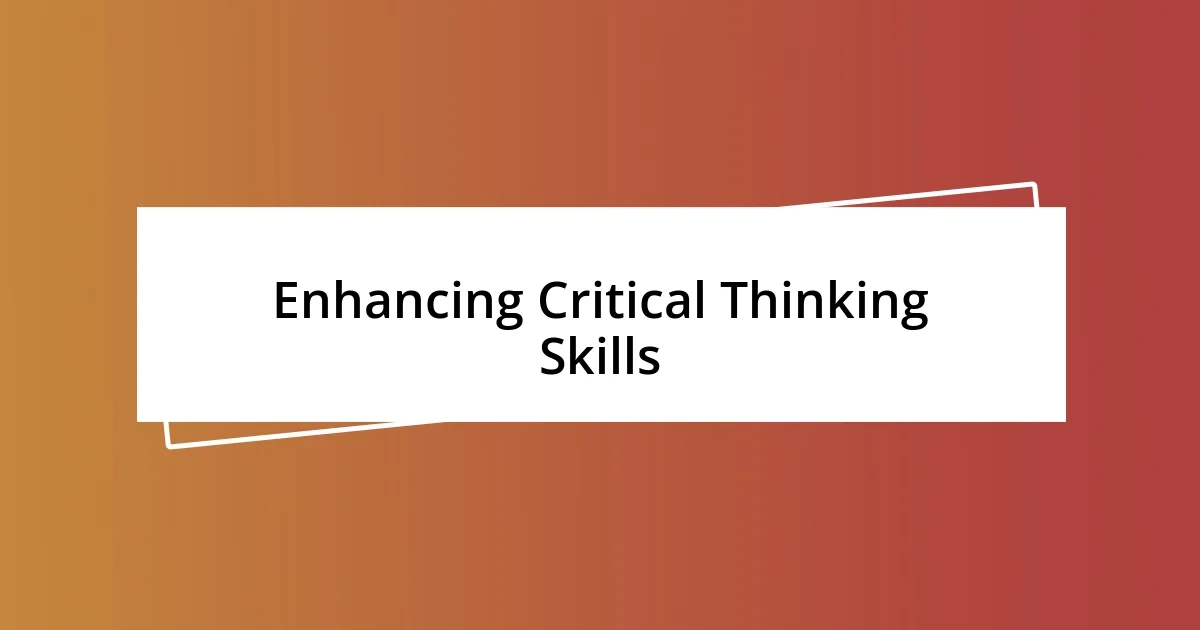
Enhancing Critical Thinking Skills
When I participate in literary festivals, I often find myself challenged to think in new, complex ways. A vivid memory comes to mind from a panel discussion centered on contemporary themes in literature. The diverse opinions presented pushed me to not just consume the thoughts of others, but to critically analyze my own views. Have you ever had a moment that made you question your stance on a subject? I did that day, as I recognized how literature serves not only as a reflection of society but as a catalyst for deeper discussions.
Attending workshops on writing techniques has honed my critical thinking—debating story structures and narrative choices invigorates my analytical skills. I distinctly remember a storytelling exercise where we dissected a popular novel’s plot twist. Engaging with my peers about the author’s intention made me realize how crucial it is to understand context and subtext. This kind of critical dialogue can transform how we appreciate literature, revealing layers we might have overlooked initially. Isn’t it fascinating how a simple dialogue can open up vast landscapes of understanding?
Through these experiences, I’ve discerned that critical thinking is about more than just analysis; it’s also about empathy. Discussing diverse narratives at festivals has enabled me to step into the shoes of characters from varied backgrounds, enriching my perspective both inside and outside literature. I remember a session focused on global narratives where I encountered voices I’d never considered before. In embracing these differing viewpoints, I found my ability to appreciate nuance grow exponentially. Doesn’t it strike you how literature can be a bridge to enhance not just our thinking, but also our capacity for empathy?
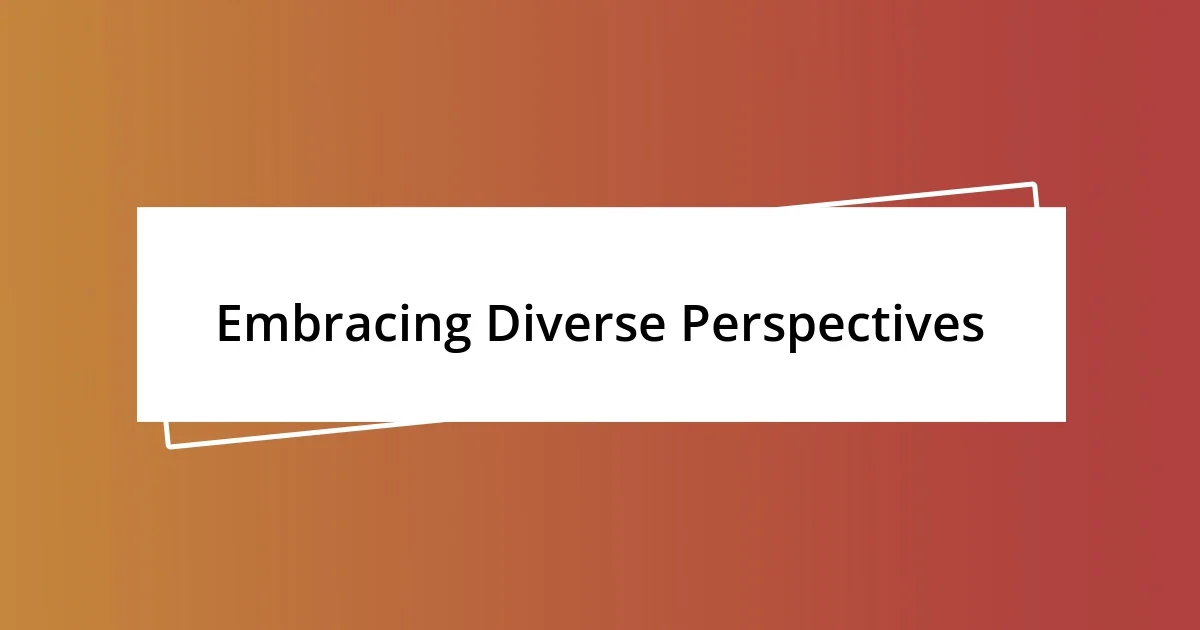
Embracing Diverse Perspectives
Engaging with diverse perspectives at literary festivals has been a transformative experience for me. I recall attending a panel discussion featuring authors from different cultural backgrounds, each sharing their unique narratives. As I listened, I couldn’t help but feel both challenged and inspired—how often do we engage with stories that tug at our different life experiences? It was a revelation that literature could be a vessel, transporting us into worlds we’ve never known and situations we may never encounter.
I vividly remember a poetry workshop where each participant shared pieces inspired by their own heritage. The room buzzed with emotions as one poet recited verses in their native tongue, followed by translations that resonated with layers of meaning. In that moment, I found myself reflecting on my own background amid the rich diversity around me. This experience drove home the point that embracing diverse narratives not only enhances our understanding of others but also sharpens our own identity. Don’t you think that when we see the world through someone else’s eyes, we grow as individuals?
What really struck me was the warmth and openness in these exchanges, which created a safe zone for vulnerability. I remember a heart-to-heart discussion following a reading where someone shared how a specific book mirrored their struggles. Their honesty invited others to reveal their truths, and the room transformed into a confessional space filled with empathy. Isn’t it amazing how literature fosters connections that allow us to embrace both our differences and our shared humanity? Each story becomes a thread in the intricate tapestry of our collective experience.
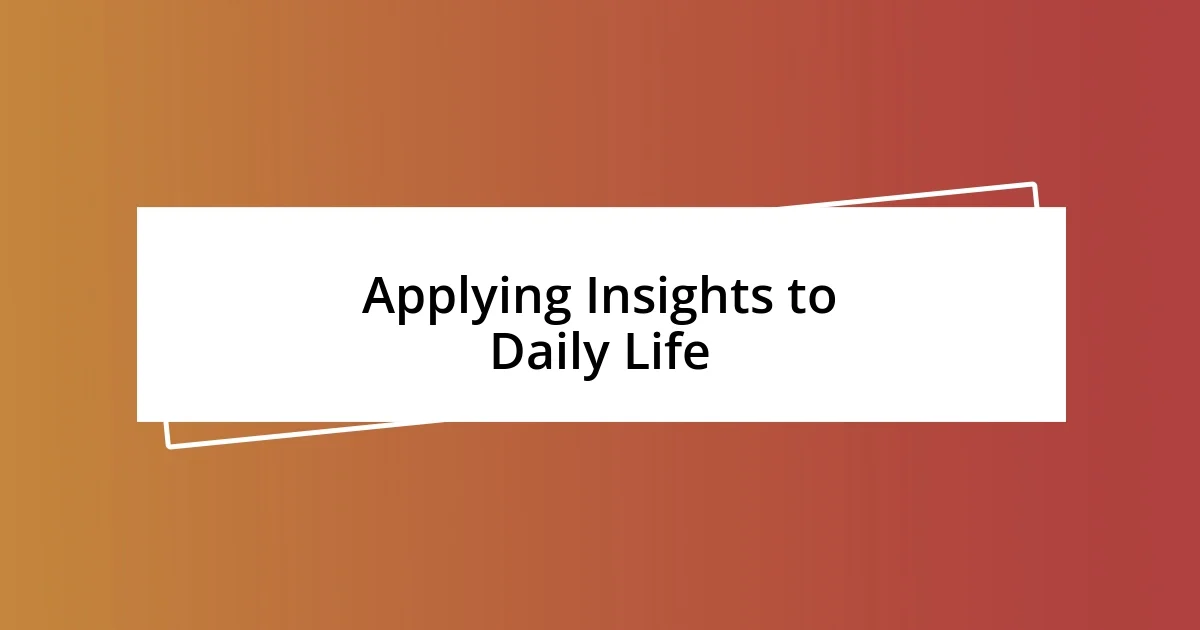
Applying Insights to Daily Life
Literary festivals have taught me to weave the insights gained from discussions into my everyday interactions. I remember leaving a session on societal issues with a fresh perspective that made me re-evaluate my conversations. Instead of merely exchanging pleasantries, I found myself probing deeper, asking questions that encouraged others to share their thoughts. Have you ever noticed how a simple inquiry can lead to profound revelations? That day, I realized the power of dialogue to transform mundane exchanges into opportunities for genuine connection.
One particularly memorable experience involved a workshop on storytelling techniques that focused on how narratives can influence our views on complex issues. I recall a moment when we were encouraged to write about a time we faced a moral dilemma. Sharing my piece made me very vulnerable, but it sparked a lively discussion about ethics in our daily lives. It struck me how reflecting on our stories—those moments that shaped us—can serve as a useful tool in navigating tough choices. Have you considered how your past experiences could inform your present decisions?
Since those experiences, I’ve made it a point to incorporate storytelling into my daily encounters. Whether I’m at a café or in line at the grocery store, I actively listen to people’s stories, valuing their unique experiences. This practice has not only enriched my relationships but has also expanded my understanding of the world. Doesn’t it feel rewarding when we can turn a fleeting moment into a meaningful exchange? By applying insights from literary festivals to my daily life, I’m consistently reminded of the shared narratives that connect us all.
